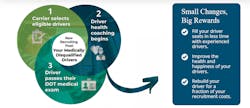Fit to Pass’ Rebuilt program serves driver recruiting, retention, and health
LAS VEGAS— Fit to Pass has added a driver health solution, Rebuilt by Espyr, it unveiled during the Truckload Carriers Association annual convention, Truckload 2022. The Rebuilt program is aimed at solving both the driver recruiting and retention challenges, along with improving drivers’ health.
Fleets can identify their medically disqualified drivers and coach them back to health using Rebuilt. After 30 days of the program, drivers earn recertification and are back in the driver’s seat. To ease the trouble of recruiting unknown drivers, Rebuilt offers fleets the opportunity to retain their known drivers, getting them back to health and recertified in order to continue working for the same company.
“It’s an easy decision for carriers to adopt, yet some are skeptical from past health and wellness programs,” said Rick Taweel, CEO of Espyr. “However, our approach to the trucking industry goes beyond improving driver’s health and wellness. We understand the recruitment and retention challenges of carriers. Fit to Pass and Rebuilt are changing the game in driver recruitment and retention. We reach and engage drivers on their terms, so they maintain their livelihoods while enabling carriers to keep their business running with known, experienced drivers.”
According to Fit to Pass, leveraging the Rebuilt program saves both time and money to get a driver back to health and recertified versus recruiting outside of the organization.
“There are an estimated 3.6 million drivers in the U.S., and research reveals that 45% to 55% of drivers have been issued a one-year or less DOT medical card, putting them at risk of being medically disqualified,” Bob Perry, Fit to Pass consultant and the trucker trainer, told FleetOwner. “Even worse, over 7% of all drivers are being medically disqualified. That’s over 250,000 drivers who can’t drive anymore. Furthermore, the top health conditions that are getting them disqualified are preventable. It’s our mission to help carriers realize the return on investment of Rebuilt and how both Fit to Pass and Rebuilt can effectively change the lives of their drivers.”
A medically disqualified driver can agree with their carrier that they want to join the Rebuilt program; Rebuilt then interviews the driver and assigns them a coach—the interviews are flexible and can be done on-site at the carrier’s location, over the phone, or even on Zoom.
Once in the program, drivers are sent a package that includes the Rebuilt manual, workout equipment, and meals—dinners for each night of the program. Also included are menus to help guide program users to healthy choices for breakfast and lunch.
“We coach them twice a day,” Perry explained. “In the mornings—cardio. In the afternoon—strength training. We take them through their workout with their bands that they have, and we give them a workout routine to do.”
Once a week, the drivers are sent to local CVS locations, a program partner, where they use the location health check stations.
“We get a read on where they are at and see how they are doing,” Perry said. “We then send the company a report of that every week on how they’re doing and how they’re progressing.”
Perry said that successful completion of the Rebuilt program takes around 30 days, or about four to five weeks.
With the Rebuilt program, Perry emphasized, “you’re saving the driver you know, today before you hire the next unknown.”
“Experience has shown us that majority of these drivers have a good driving record. They just don’t know how to manage that [health aspect], because we don’t teach that in school,” he continued. “They’re not taught. They don’t know how to make better health decisions out there on the road, better food choices.”
A major aspect of the Rebuilt program is health coaching and training, with a focus on eating simple, eating clean; tracking caloric intake and fluid intake, and avoiding overeating.
One such training aspect is known as the ‘pre-trip refrigerator check,’ which Perry related to a driver’s pre-trip safety check. The training is focused on getting drivers to replace on-the-road eating choices with healthier options and ensuring that they are preparing their food and drink choices with the diligence they exert on their vehicle safety inspections.
“If you have a fleet, could be 200 or 2,000, chances are 50% of that fleet has a one-year card, or a 90-day card,” Perry warned. “We lose them fast. If they have a one-year card, that means they have already been diagnosed as prehypertensive; they’ve already been diagnosed that they could be pre-diabetic; or, they have sleep apnea. If you don’t do something between that window, chances are they are going to fail—and you are going to lose them and you end up losing a qualified driver.”
About the Author
Tyler Fussner
Assistant Editor | Vehicle Repair Group
Tyler Fussner is a former assistant editor for Endeavor Business Media's Commercial Vehicle Group, including FleetOwner and Fleet Maintenance.

